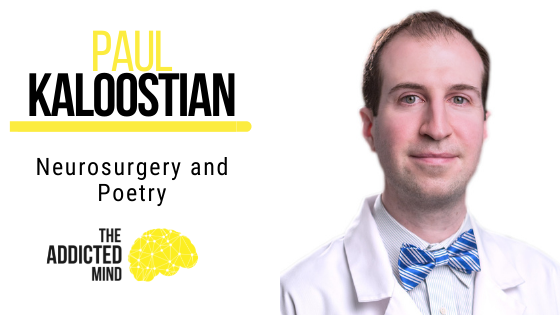Why is addiction so hard to control? Does that mean addiction can’t be treated? On today’s episode of The Addicted Mind Podcast, Duane talks to Dr. Paul Kaloostian.
Dr. Paul Kaloostian is a neurosurgeon in Los Angeles as well as an author. His books include The Young Neurosurgeon: Lessons from My Patients and two different poetry books, From The Eyes Of A Doctor and My Surgical Cases Told In Poems.
As a neurosurgeon for 17 years now, Dr. Kaloostian has dealt with thousands of cases of people with neurological conditions. Seeing the need for awareness of mental health, he took a poetic approach to his books to make it easier for the world to understand what it’s like for patients who are going through neurological conditions, some of which are caused or aggravated by addiction.
On today’s episode, he talks about the brain, his patients, and why we do some of the things we do even when we don’t necessarily want to do them.
No one wants to be addicted. But the brain is such a powerful organ that what our brains decide to do is what we do. We don’t really have that much control. That’s why addiction is a hard problem to fight and beat. The brain is a powerful organ so once it gets stimulated, it’s difficult to change. It takes work and energy – but it’s not impossible.
Because of Paul’s compassion for his clients and his appreciation for the vulnerability of his clients to come and seek help, this is an episode you need to listen to. While you may not fully understand what people with neurological conditions are going through until you’ve gone through the same experience, having the ability to understand these concepts today is a good way to start to develop empathy.
In this episode, you will hear:
- What drew Paul to neurosurgery
- Why he took a medical poetic approach in writing his books
- The need to show empathy to these patients
- How the brain is linked to addiction
- Areas of the brain responsible for addiction
- Why addiction is a pathological condition
- Why addiction is so hard to control
Key Quotes:
[04:30] – “A single cell of the brain has so many different functions within it. It’s literally a universe within a cell.”
[06:54] – “We only really use about five to 10% of our brains… And just imagine if we’re able to utilize another 10% of our brains, what we would know, and 50% more of our brains, what we would know.”
[12:02] – “Addiction is a big, big problem, not only in the field I’m in but just globally, in terms of economic costs, and medical costs and violence that happens.”
[12:44] – “After a while of doing drugs, alcohol, or smoking, the brain thinks that’s normal so it makes your body want to stay in that environment.”
[15:08] – “It’s really the reward part that dominates because people like that high feeling of winning, being happy and super excited. That always will win over any other type of feeling in your brain. That’s just part of the addiction process.”
[15:54] – “What our brains decide to do is what we do. That’s why the brain is such a fascinating and critical aspect of our lives.”
[16:37] – “The brain is very, very powerful. And once the brain gets stimulated, it’s a powerful organ to change. It takes work and energy. But it’s not impossible.”
Subscribe and Review
Have you subscribed to our podcast? We’d love for you to subscribe if you haven’t yet.
We’d love it even more if you could drop a review or 5-star rating over on Apple Podcasts. Simply select “Ratings and Reviews” and “Write a Review” then a quick line with your favorite part of the episode. It only takes a second and it helps spread the word about the podcast.
If you really enjoyed this episode, we’ve created a PDF that has all of the key information for you from the episode. Just fill in your information below to download it.

